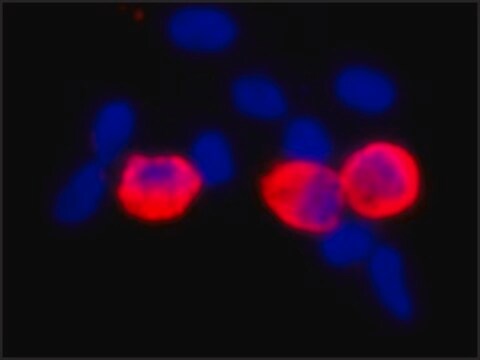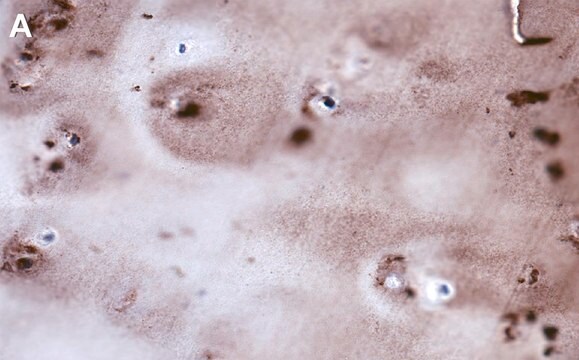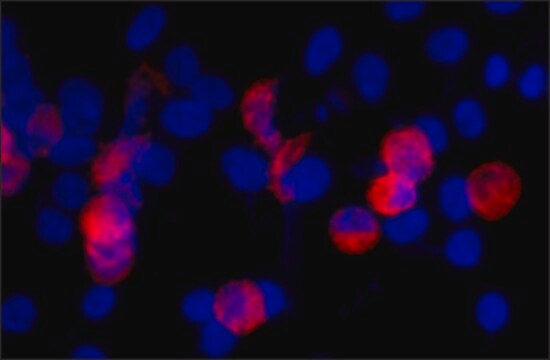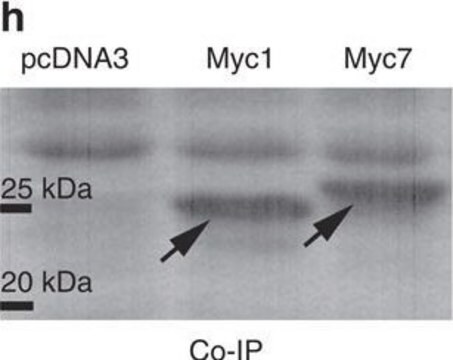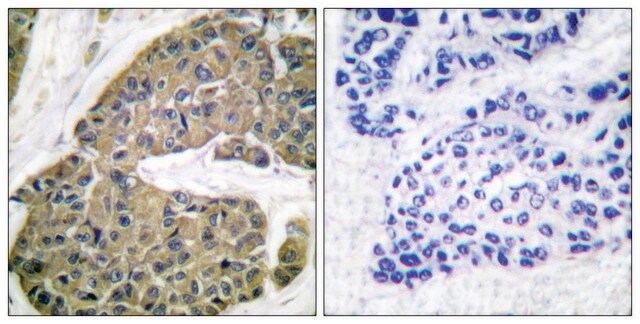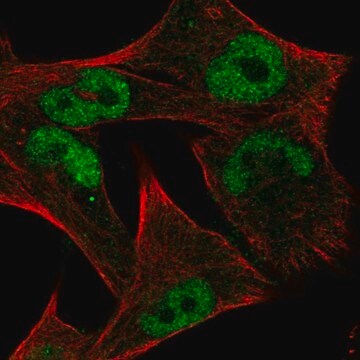추천 제품
생물학적 소스
rabbit
Quality Level
결합
unconjugated
항체 형태
purified antibody
항체 생산 유형
primary antibodies
클론
Unknown, polyclonal
분자량
calculated mol wt 48.8 kDa
observed mol wt ~54 kDa
정제법
affinity chromatography
종 반응성
mouse, human
포장
antibody small pack of 100 μL
기술
immunocytochemistry: suitable
western blot: suitable
동형
IgG
에피토프 서열
Internal
단백질 ID 수납 번호
UniProt 수납 번호
배송 상태
ambient
타겟 번역 후 변형
unmodified
유전자 정보
rabbit ... MYC(4609)
일반 설명
Myc proto-oncogene protein (UniProt: P01106; also known as Class E basic helix-loop-helix protein 39, bHLHe39, Proto-oncogene c-Myc, Transcription factor p64) is encoded by the MYC (also known as BHLHE39) gene (Gene ID: 4609) in human. c-Myc is a transcription factor that binds DNA in a non-specific manner, yet also specifically recognizes the core sequence 5′-CAC[GA]TG-3′. It regulates the expression of multiple genes involved in apoptosis, cell differentiation, and proliferation. It is involved in the regulation of several growth promoting signaling pathways and is considered as an immediate early response gene that is downstream of many ligand-membrane receptor complexes. Its expression is tightly regulated by several transcriptional regulatory motifs within its proximal promoter region. Phosphorylation of c-Myc by serine/threonine kinase PIM2 at serine 329 is reported to lead to its stabilization. Active c-Myc is coupled to the MAX protein via its C-terminal helix-loop-helix leucine zipper (bHLHLZ) domain (aa 413-434) and this heterodimer interacts with a number of other transcription-related proteins. In normal cells its expression and function are regulated by developmental or mitogenic signals. c-Myc mRNA has a very short half-life and in the absence of positive regulatory signals there is a significant reduction in its transcription leading to low c-Myc protein levels that does not have any proliferative drive. However, in tumor cells its levels are increased either via mutations or induction via upstream oncogenic pathways. Serine 71 is shown to be phosphorylated by c-Jun kinase (JNK) that leads to induction of c-Myc induced apoptosis. Mutations leading to S71A/S81A are known to enhance transformation of cells and are shown to be more potent oncogenic mutants. It has been reported that the individual S71A and S81A mutants are not enough to promote increased transformation, but when combined they enhance transformation. Some mutations in c-Myc gene have been linked to B-cell chronic lymphocytic leukemia and Burkitt lymphoma. Over-expression of c-Myc has been reported in about 40% tumors. (Ref.: Wasylishen, AR., et al. (2013). Cancer Res. 73(21); 6504-6515; Miller, DM et al., (2012). Clin. Cancer Res. 18(20); 5546 5553; Noguchi, K., et al. (1999). J. Biol. Chem. 274(46); 32580-32587).
특이성
This rabbit polyclonal antibody detects c-Myc protein. It targets an epitope from the internal region.
면역원
GST/His-tagged recombinant fragment corresponding to 111 amino acids from the internal region of human c-Myc.
애플리케이션
Quality Control Testing
Evaluated by Western Blotting in Jurkat cell lysate.
Western Blotting Analysis: A 1:1,000 dilution of this antibody detected c-Myc in Jurkat cell lysate.
Tested Applications
Western Blotting Analysis: A 1:1,000 dilution from a representative lot detected c-Myc in lysates from Raji cells.
Immunocytochemistry Analysis: A 1:1,000 dilution from a representative lot detected c-Myc in A431 cells.
Note: Actual optimal working dilutions must be determined by end user as specimens, and experimental conditions may vary with the end user
Evaluated by Western Blotting in Jurkat cell lysate.
Western Blotting Analysis: A 1:1,000 dilution of this antibody detected c-Myc in Jurkat cell lysate.
Tested Applications
Western Blotting Analysis: A 1:1,000 dilution from a representative lot detected c-Myc in lysates from Raji cells.
Immunocytochemistry Analysis: A 1:1,000 dilution from a representative lot detected c-Myc in A431 cells.
Note: Actual optimal working dilutions must be determined by end user as specimens, and experimental conditions may vary with the end user
Anti-c-Myc , Cat. No. 06-340-I, is a rabbit polyclonal antibody that detects c-Myc and is tested for use in Immunocytochemistry and Western Blotting.
물리적 형태
Purified rabbit polyclonal antibody in buffer containing 0.1 M Tris-Glycine (pH 7.4), 150 mM NaCl with 0.05% sodium azide
저장 및 안정성
Recommend storage at +2°C to +8°C. For long term storage antibodies can be kept at -20°C. Avoid repeated freeze-thaws.
기타 정보
Concentration: Please refer to the Certificate of Analysis for the lot-specific concentration.
면책조항
Unless otherwise stated in our catalog or other company documentation accompanying the product(s), our products are intended for research use only and are not to be used for any other purpose, which includes but is not limited to, unauthorized commercial uses, in vitro diagnostic uses, ex vivo or in vivo therapeutic uses or any type of consumption or application to humans or animals.
적합한 제품을 찾을 수 없으신가요?
당사의 제품 선택기 도구.을(를) 시도해 보세요.
Storage Class Code
12 - Non Combustible Liquids
WGK
WGK 1
Flash Point (°F)
Not applicable
Flash Point (°C)
Not applicable
시험 성적서(COA)
제품의 로트/배치 번호를 입력하여 시험 성적서(COA)을 검색하십시오. 로트 및 배치 번호는 제품 라벨에 있는 ‘로트’ 또는 ‘배치’라는 용어 뒤에서 찾을 수 있습니다.
자사의 과학자팀은 생명 과학, 재료 과학, 화학 합성, 크로마토그래피, 분석 및 기타 많은 영역을 포함한 모든 과학 분야에 경험이 있습니다..
고객지원팀으로 연락바랍니다.